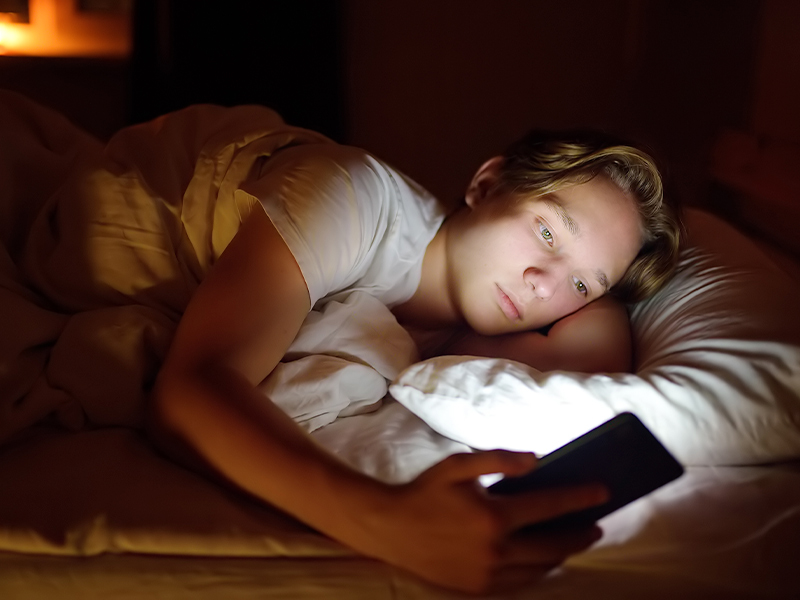How late-night scrolling and puberty is causing teen sleep deprivation
From increased screen times to developmental changes, it’s no surprise teen sleep deprivation is a big issue for many families.
Whether they’re snoozing alarms or ignoring them altogether, teenagers certainly aren’t known for their early morning energy.
But why are teens notoriously tired?
According to experts, it’s a combination of late night scrolling and the natural physiological changes that occur during adolescence.
“Puberty hormones shift the teenager’s body clock forward by about one or two hours, making them sleepier one to two hours later,” Headspace App Mental Health Expert, Carly Dober, says.
Pair this with the temptations of late night screen time, and teens are struggling to get the sleep they need.
Why teenagers need more sleep
Sleep is essential for us all, but especially for still-developing teens.
So important that the Australian government recommends they get 8-10 hours per night, as opposed to an adult’s 7-9 hours.
“Teens’ brains are developing at such a rapid rate, that sleep is a non-negotiable,” Carly says.
“Sleep is essential for teenagers because it plays an important role in their physical and mental development.”
Despite their natural tendency to sleep in, a 2018 study found that only half of 16-17 year-olds get enough sleep.
These stats were recorded from weeknights only, where a morning school schedule forces teens up and out of bed.
“While teenagers fall asleep later, school start times do not allow them to sleep in,” Carly says.
“This nightly ‘sleep debt’ leads to chronic sleep deprivation.”
With this lack of sleep, sleep expert Olivia Arezzolo says teenagers are compromising on some pretty important processes like memory retention and immunity.
“During deep sleep, our brains detoxify from beta amyloid, a neurotoxin that contributes to brain fog and memory loss,” Olivia says.
“This is why without sleep, we struggle to focus, concentrate and accurately remember facts.”
Olivia says deep sleep is also when we produce 70 per cent of human growth hormone, which is the key hormone for cellular repair and recovery.
“We compromise this process if we don’t get sufficient sleep, which leaves us feeling fatigued, exhausted, and more likely to get sick,” she says.
- Sleep tech: Can gadgets actually help you nod off?
The impact of screens before bed for teens
While the government recommends that adolescents be off screens at least an hour before bed, many can’t resist.
A study by the Australian Institute of Family Studies found that 90 per cent of 8-18 year-olds used an electronic device in the hour before bed at least one night a week, with 51 per cent using devices every night.
Engaging TikToks and new-release Netflix shows not only keep the brain switched on, but a screen’s light cues the brain to stay awake too.
“In the evening, blue light emitted from televisions, mobile phones and computers can prevent adequate production of melatonin, the neurotransmitter responsible for sleep,” Carly says.
What does this mean for teens?
Shorter sleep durations, lower quality sleep, greater sleep latency (the time it takes to fall asleep) and next-day sleepiness are all associated with screen use before bed, according to a 2016 systematic review.
- Healthy balance: How to help kids get enough exercise and sleep
How to create a healthy sleep routine for teens
Broaching the bedtime issue can be tricky, especially with teenagers.
“Try to work with your teen and not argue with them, as they are more likely to collaborate when you actively discuss the issue with them,” Carly says.
Just as no parent wants to live with a sleep-deprived teenager, no teenager wants to feel the wrath of a poor night’s sleep.
Carly recommends the following tips to help get your teen on board with a healthy sleep routine:
You can:
- Allow your child to sleep in on the weekends
- Encourage an early night once a week
- Decide together on appropriate time limits for any stimulating activities like homework or screen time
- Avoid early morning appointments, classes or training sessions if possible
- Encourage your teen to take an afternoon nap after school to help recharge their battery, if they have time.
- Screen time: 8 things parents should know
Written by Hayley Hinze.






